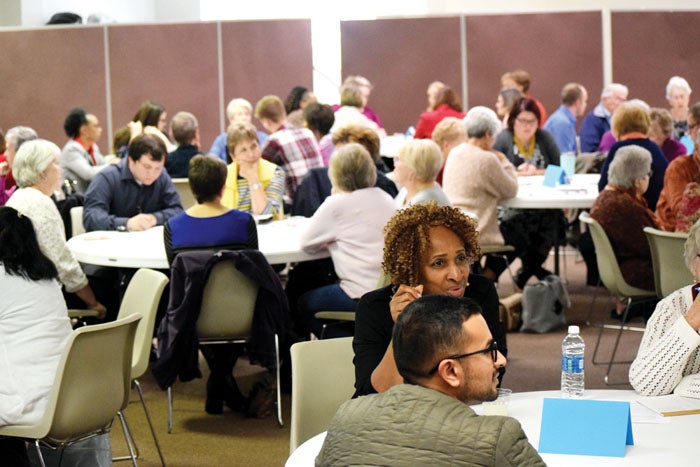Senior-Age-Friendly Forsyth connects aging adults, community services
Published 12:00 am Thursday, January 30, 2020

- Age-Friendly Forsyth focus group held at Clemmons United Methodist Church
|
Getting your Trinity Audio player ready...
|
By Larry Stombaugh
For the Clemmons Courier
Age-Friendly Forsyth (AFF) is a community initiative that connects, informs, and engages aging adults and community partners to create a livable community through collaborative planning and action with the vision that aging adults (adults aged 60 and older) are living their best lives. During the past year, a resident leadership body, the Community Engagement Council (CEC), has been developed to advance the vision of Age-Friendly Forsyth. This group includes 16 community organizers who geographically represent Forsyth County’s aging population.
Currently, AFF is in its second year of operation, with early activities including a comprehensive research phase where baseline data was collected across a variety of indicators, followed by an intensive planning phase, both of which included a variety of organizational partners such as healthcare, and other nonprofits, corporate, education and philanthropic agencies, as well as community members. Theresa Hoffman-Makar is the project manager for Age-Friendly Forsyth. She noted that two organizations have served as the backbone of AFF — Senior Services as the fiscal agent, and Forsyth Futures as the project management and data/research support.
Key findings from the data collected indicated both positive results from seniors living in Forsyth County, as well as some specific areas of concern. Positive results included that aging adults were generally satisfied with Forsyth County as a place to live, and positively perceived their ability to influence decision making in the county. Some areas of concern included a need for improved public transportation, caregiver relief, an improved sense of community, improved services awareness, and home repair/modifications needs.
Over the past year, AFF has conducted more than 25 community conversations throughout Forsyth County — seven of which have taken place in the Clemmons and Lewisville area. These community conversations, headed by members of the CEC, were critical in determining community priorities, and led the initiative to identifying its first two issue-specific teams — services awareness and access, and home repair/modification needs.
Over the past year, AFF has been working closely with the Clemmons Community Foundation to determine community needs of aging adults within the Clemmons and Lewisville area. Through a series of several focus group-style community conversations, the following needs have been identified:
- The need for more awareness of services and resources available
- Improved sense of community
- Affordable housing that fits the needs of aging adults, for example one-level living
- Improved transportation, and more transportation options
- A central gathering place with programs and activities, such as the addition of a community center
Additionally, considering data collected from the larger study, the Clemmons and Lewisville area have a large number of aging adults serving as caregivers — roughly 34% (3,000) of aging adults living in this area. Clemmons and Lewisville aging adults are also experiencing home repair and modification needs; approximately 14% (1,300) of aging adults have some type of home repair need. Socialization related challenges in this area include 28% (2,500) of aging adults live alone, additionally 25% (2,300) of aging adults would like to be doing more socially. This data is consistent with results from community conversations held in the area, where many indicated that more recreational activities and opportunity was desired, including the need for a centralized location where aging adults could gather and socialize.
Positive outcomes of the data collected for the Lewisville and Clemmons communities is the impressive number of seniors who are active volunteers. Roughly 48% (4,300) of aging adults in the Clemmons and Lewisville area do volunteer work. Hoffman-Makar noted that this is an impressive rate of volunteer activity compared to most communities; “Aging adults in our county are very active in volunteer work, with many having the desire to volunteer but being unable to due to barriers such as lack of time, health reasons, lack of transportation, and not knowing where to volunteer.”
With a multitude of data in-hand and the initiative’s first two priorities identified, the next steps for AFF include building out the issue-specific teams — Action Teams. Beginning in early February, Action Teams will meet monthly from January through March. These teams will be comprised of residents and organizational representatives who will make data-informed decisions to act on strategies to identify best practices and to design new programs to address gaps in the aging adult service system.
Anyone interested in obtaining information about the Action Teams or Age-Friendly Forsyth can contact Theresa Hoffman-Makar at theresa@forsythfutures.org or call 336-701-1700, ext. 103.

